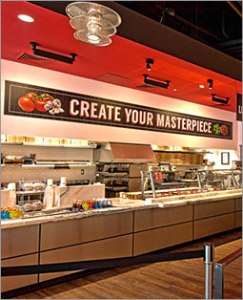Would a Pizza Studio franchisee need to use job-costing or process costing for its made-to-order pizzas?
Pizza Studio is a relatively new pizza chain that takes the made-to-order model used by Chipotle and Subway and applies it to pizzas. At a counter, customers order their pizzas with exactly the crust, sauce, cheese, and toppings they want – and then watch as the pizza travels through a conveyor-belt oven, being blasted with 150 degree heat, and then see it emerge two minutes later, hot and bubbling.
Pizza Studio has many choices for pizzas. In addition to traditional, crust choices include whole grain & flax seed, rosemary herb, and firecracker. Sauces include tomato blend, basil pesto, tangy BBQ, spicy buffalo, and others. Cheese selections include mozzarella, feta and goat cheese. Pizza Studio offers a wide variety of unlimited toppings: minced garlic, artichoke hearts, Kalamata olives, zucchini, Jamaican jerk seasoning, and caramelized onions are a sampling of the toppings available. Describe Pizza Studio process here.
The price of each pizza is $7.99.
Pizza Studio was founded in 2012 and has nearly 25 locations, with additional locations planned to be added throughout 2015. It has several franchise operators; most of Pizza Studio’s growth is projected to be through the opening of new franchise locations.
Questions
- Does an individual Pizza Studio franchise operator need to decide whether to use a job-costing system or a process costing system for the pizzas it sells? Why or why not?
- Assume that Pizza Studio pizzas are extremely popular and Pizza Studio decides to expand into local grocery stores with frozen Pizza Studio pizzas. Do you think Pizza Studios would use more of a job-costing system or a process-costing system for the pizzas it produces for grocery stores? Explain.
Candela Citations
- Would a Pizza Studio franchisee need to use job-costing or process costing for its made-to-order pizzas?. Authored by: Dr. Wendy Tietz, CPA, CMA, CGMA. Located at: http://www.accountingintheheadlines.com. License: CC BY-NC: Attribution-NonCommercial
